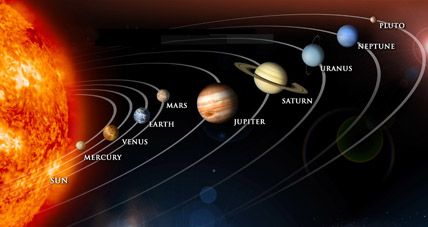How the names of the planets came in!!!!!
The name of the solar system is named as a special organization named International Astronomical Union (IAU). The organization was established in 1919. IAU is the only recognized organization for the name of all planets. Each member is professional astronomer.
According to the IAU, astronomy is a very ancient science and many of its nomenclature have been going from antiquity or historically introduced. Initially, the ancient names of the few planets of the solar system came from Roman mythology or Greek mythology. Keeping the tradition of the IAU, the rest of our solar system (the only exception, the earth and the moon) have kept names of planets and satellites from Greek and Roman methyls.
Mercury (Mercury): Mercury is the name of Mercury from the Roman god of Mercury.
Roman Greek name for "Mercury" Hermes (Hermes The God of Traveling, Commerce and Thievery). Hermes is a business and travel god. He is also called God's messenger. The main feature of Marcari or Hermes is its rapid speed. Mercury's "Mercury" name due to this rapid speed feature. Because, Mercury also has a tremendous speed (56 km in seconds, where the Earth travels around 36 km per second) orbits the sun.Vine (Venus):
Venus is named after the goddess of love of Venus or Greek goddess Aphrodite (Aphrodite, The Goddess of love and beauty) and its beauty is named after Venus. The most beautiful and beautiful planet in our solar system - VenusEarth (Earth): Earth's name does not have any meaningful meaning. The word Prototo-Germanic originates Earth from Eartho.
Mars (Mars): Mars is named after Mars, whose Greek name is Ares The God of War.
Because the battlefield was red like the bloody atmosphere, the Romans named it Mars.Jupiter (Jupiter): Father of the God and Men, that is the God of Father God and Father of the Roman God Jupiter.
Everyone knows him as the Greek, "Zeus, the Father of All God and Men, The God of Thunder, the Ruler of Olympia". Jupiter's name is not needed to tell anyone because of the name. Just like Zeus, this huge and huge Jupiter planet
Jupiter's (88,695 km) radius is 11 times the radius of Earth (6400 km). The volume is 1300 times the world's largest. Jupiter is so large that its mass is more than two and a half times the combined mass of the solar system. So there is nothing to be surprised to name Jupiter in the name of the most powerful god. Jupiter's satellites are named after the Greek god-goddess / Demi-Gods (half-human, half-deity) associated with blood with Zeus.
- Saturn (Saturn):
Saturn is named after the Roman name "Saturn" - Zeus, Poseidon, Hyde's, and Hera's father, a very big titan "Cronos, god of farming and the father of Zeus / Jupiter". Cranos is a very cruel, antidote and king of the Titans. Saturn's satellites are named after all the titans who are all brothers of Cronos.
- Uranus: Uranus is named after Uranus, Greek goddess.
Astronomer William Leslie first discovered two satellites of Uranus, and introduced a system that named everyone the names of the Uranus satellites in the name of Shakespeare and Alexander Pope.
Neptune: Neptune is named after the Roman god of the Neptune, whose Greek identity "Poseidon, The God of Sea".
All Neptune satellites are named after Poseidon's relatives, friends and lover.Pluto: Pluto was named after Pluto, the god of death and paternal aunt, whose Greek name Hades (The God of Death and Underworld). Because right Pluto's position is so far away and so dark that Pluto could be considered as a suburban / ghost.
The name of Charon, Pluto's only satellite is quite dramatic. A Greek sophisticated sailor, who died after death, took the boat to Pathalpuri.
great post bro.
great
thanks for sharing